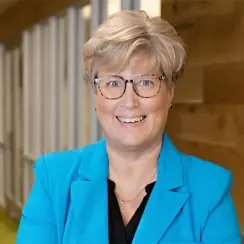 | 1 LU | HSW |
 | 1 LU | HSW |
Call to Action:
Abstract: Public schools are undergoing a profound transformation that reflects historical shifts with the emergence of new technologies. This presentation delves into the evolving role of public schools with the integration of artificial intelligence (AI), and how architects can serve as changemakers, designing spaces that support and inspire pedagogical innovation, collaboration, and student well-being. By engaging in this dialogue, architects and educators will collaborate to envision the future of school design, ensuring that learning environments not only meet current needs but also anticipate the challenges and opportunities of tomorrow. Together, we can redefine educational spaces to inspire the next generation of learners and leaders.
Learning Objectives:
Educational Visioning
Facilitating the translation of educational goals/vision into school design requirements.

Kristina is a former innovative principal with over 33 years of experience in education. Kristina had the opportunity to work on a design build project from bond to occupancy leading a community of teachers, students, and parents on a journey to create a school that matched the richness of their culture and mission. This experience informs her current work as an Educational Planner helping guide stakeholders through the process of dreaming what is possible, to create world class learning facilities and how to utilize it in a way that enhances the well-being of students and teachers.

Rebecca is a practicing Architect in Central Texas with a career focus on educational architecture. In the past 30 years, she has been in design leadership positions for over 20 new PK-12 educational facilities. She is grateful for the recognitions many of the schools have received but is even more grateful for having played a part in the experiences of the students and educators journeying through the facilities. Passionate about the conversations Innovative Learning Environments bring to the table, Rebecca is committed to seeking the balance of designing for human experiences, cultural context, and the natural environment.